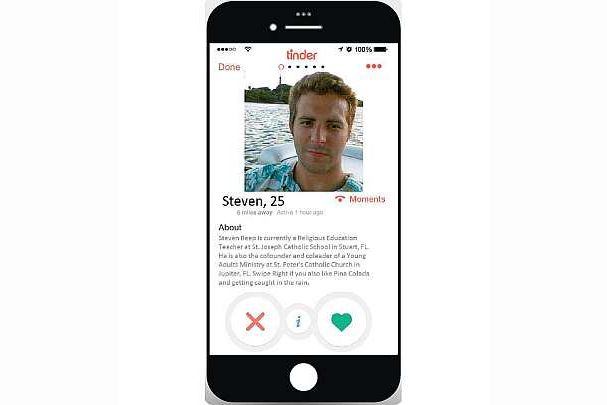This article first appeared in the Postmodern Realities column of the Christian Research Journal, volume 40, number 04 (2017). The full text of this article in PDF format can be obtained by clicking here. For further information or to subscribe to the Christian Research Journal go to: http://www.equip.org/christian-research-journal/
Social media has become the social norm for my generation, known as the Millennials. We share photos with our friends through Snapchat and Instagram and share photos with our family through Facebook. This social media social norm is “now trending” into the dating life of my generation. In fact, studies have shown that over one third of new marriages result from couples meeting online.1 However, it appears we are not using apps such as Tinder and Bumble to find a life mate, because recent polls show that Millennials are delaying marriage longer than any other generation.2 Although some Millennials do use these apps to find their “Tinderella,” it seems that most use it for a very different reason. These apps have come to be known as hook-up apps because with them you usually can get someone to come over as easily as you can order food online. If you are hungry, you can order a pizza. If you are lonely, you can talk to many new people by swiping right. If you are lonely physically, you can get these same people to spend the night with just a few cheesy pickup lines. This all coincides with my generation’s objectifying view on romantic love that is very different from the traditional Christian view.
Erring on Eros. Throughout history, many of the world’s greatest thinkers, both Christian and secular, have held that objectifying the other sex is the root of immorality in extramarital sexuality. For example, Immanuel Kant defines and warns against objectification when he writes, “Act in such a way that you treat humanity, whether in your own person or in the person of any other, never merely as a means to an end, but always at the same time as an end.”3 Kant very clearly says that we should not use a human solely as a means to an end or as an object to get what we want. Unfortunately, this seems to be exactly what is happening with Millennials when we use apps such as Tinder to hook up with someone whenever we want sexual interactions. Even though both parties may be consensually using each other and meeting each other’s needs, they are still using a person as a means for pleasure instead of an end to be loved.
To be clear, there is nothing wrong with being attracted to a person’s beauty, sense of humor, intellect, or ability to provide. In fact, I believe these attractive qualities are all good things that God has given as gifts to people. Attractive qualities should be used as a means to draw the lover to the beloved. I may talk to a girl because she is beautiful, but her looks should just be a tool to lure me in to get to know her as a person. However, Millennials seem to flip-flop the two and treat a person as a means to get the end goal of sex. My generation’s view on romantic love is the opposite of what C. S. Lewis identifies as eros, because he writes, “Now Eros makes a man really want, not a woman, but one particular woman. In some mysterious but quite indisputable fashion the lover desires the Beloved herself, not the pleasure she can give.”4 Objectification is morally wrong because it uses a human soul, made in God’s image, as a tool to obtain an end that ought to be a means.
In Hebrew, sin means “to miss” because it is understood that a sin is something that misses God’s intended purpose. In objectification, we not only miss the target with our arrow but also attempt to throw the target at the arrow. With such a warped view of romantic love, it is no wonder that my generation has a fading desire to participate in the end goal of eros, which is marriage.
The End of Love and Marriage? I stated above that marriage is the end goal of eros. That is the traditional Christian view of romantic love. Though the New Testament does not specifically talk about eros, it does speak a lot of marriage. This is because most marriages in that time were family arrangements. They understood the commitment of their vows to be far superior to the fickle feeling of eros. Anyone who has been in love knows that the promise of eros is accompanied by Cupid’s curse. That is, lovers can’t help but to promise to love each other forever, but at the same time, the feeling of being in love comes and goes with the tides. Eros points to the lifelong commitment to which it can’t commit, and without which it is incomplete. Only with the eternal vows of marriage that transcend the fickle feelings of eros can a couple promise to love each other till death do them part. Therefore, just as sexual attraction is a means that sparks the end goal of eros, eros is a means that sparks the end goal of marriage.
What does the Bible say about marriage? The best analogy can be found in Ephesians 5:22–33. In this passage, the apostle Paul compares the relationship of a married man and woman to the relationship of Christ and the church. He says, “Husbands, love your wives, as Christ loved the church and gave himself up for her” (Eph. 5:25). Husbands should give up their lives in complete dedication. In a similar way, Paul tells wives, “Now as the church submits to Christ, so also wives should submit in everything to their husbands” (Eph. 5:24). This is neither an ancient misogynistic nor a new age feminist view on marriage. The Christian view of marriage calls for a mutual and complete dedication by both the man and the woman.
Marriage puts us in direct connection with love Himself, God. This is because when we give up our life for our significant other, we learn a much higher form of love. This form of love is the Christian love that has been known as charity, or agape. Just like the end of physical attraction is eros, and the end of eros is marriage, the end of marriage is agape. This is the love Thomas Aquinas speaks of when he writes, “To love is to will the good of the other.”5 Agape truly is an act of will that we must constantly choose, unlike eros, a wavering feeling. The vows that are connected to marriage exemplify this commitment of the will “for better or for worse.” Unfortunately, this understanding of eros, marriage, and agape seems to have been lost among today’s youth. My generation asks not what they can do for love but what love can do for them. The same self-centered view of love, which is responsible for the intense flux of divorces in recent decades, is the reason why Millennials are perfectly content with swiping into meaningless relationships and not considering marriage.
Free to Love. As an American Millennial, I was raised on the promises and glory of freedom. The Christian view of love and marriage that requires one to give up one’s life and freedom to his or her spouse used to scare me, until I read what Pope John Paul II (then known as Karol Wojtyla) wrote in his book Love and Responsibility. He said, “The will aspires to the good, and freedom belongs to the will, hence freedom exists for the sake of love, because it is by the way of love that human beings share most fully in the good.”6 I saw that God gives us freedom only so that we can choose to love or not. That is why Wojtyla concludes that “freedom is the means and love is the end.”7 When we dwell in freedom, we are lost, unhappy, and unfulfilled, searching for something more; but when we use our freedom to find love and totally give ourselves to someone else in agape and become “one flesh,” we are complete, happy, and fulfilled. I am reminded of our Lord’s words, “For whoever wants to save his life will lose it, but whoever loses his life for My sake will find it” (Matt. 16:25).
Tinder for Love. By no means is this article a protest against apps such as Tinder but rather a warning on how they can be misused. Tinder is very appropriately named after a dry material that is used to ignite a fire, and fire has been used for both arson and giving life-sustaining heat. In the same way, dating apps can be used to feed a burning lust or to help find that special someone who will set your world on fire.
The intended purpose of physical attraction is to spark eros. The purpose of eros is to spark marriage. The purpose of marriage is to spark a lifelong relationship that teaches us the purpose of freedom and life, which is agape. Agape is the spark that ignites us to that consuming fire who is love Himself, our Heavenly Father.
Steven Reep, MDiv, is currently a religious education teacher at St. Joseph Catholic School in Stuart, Florida. He is also the cofounder and coleader of a Young Adults Ministry at St. Peter’s Catholic Church in Jupiter, Florida.
NOTES
- Sharon Jason, “Study: More than a Third of New Marriages Start Online,” USA Today, http://www.usatoday.com/story/news/nation/2013/06/03/online-dating-marriage/2377961/.
- John Fleming, “Gallup Analysis: Millennials, Marriage and Family,” Gallup, http://www.gallup.com/poll/191462/gallup-analysis-millennials-marriage-family.aspx.
- Immanuel Kant, Grounding for the Metaphysics of Morals (Indianapolis: Hackett Publishing Company, 1993), 36.
- S. Lewis, The Four Loves (Orlando: Harcourt, 1991), 94.
- Thomas Aquinas, Summa Theologica, Book II, Part II, Question 26, Article 6.
- Karol Wojtyla, Love and Responsibility (San Francisco: Ignatius Press, 1981), 135.
- Ibid., 136.









